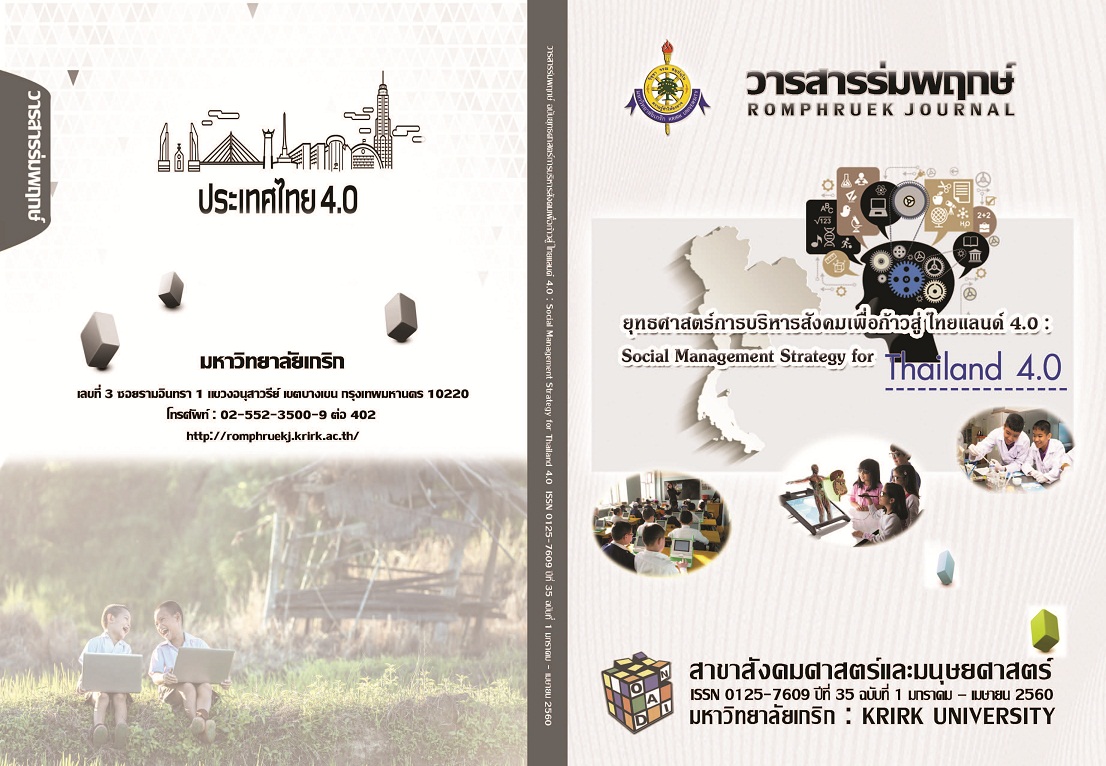Business Direction on Belief in Thailand 4.0
Main Article Content
Abstract
Belief is considered a part of Thai people which is varied according to the basic education, family, society, culture, tradition, politics and economy. Nowadays, society enters the era of globalization which is a period of technological prosperity and also brings information flowing infinitely boundless. If the recipient has belief without the use of intelligence, scrutinize and analyze those data with judgment. There may be a problem in applying that information. Therefore cultivate virtues and knowledge to develop intelligence for the people to use judgment, reason, and live sufficiently without persecute others is important to manage properly in three dimensions; 1) social dimension: understanding of the different contexts and dynamics of complex belief in a multicultural society. 2) legal dimension: measures or rules that concern clearly about belief in terms of the consumer protection, human rights, price of goods and services, the electronic business and the promotion and preservation of the intangible cultural heritage, and 3) business management model: the adjustment of business model concerning belief in the proactive way with innovation and real time communication to cover the comprehensive regulatory practices of belief in the form of a multicultural society in order to create a new dimension of the belief in Thailand.
Article Details
Every article published in the Romphruek Journal of the Humanities and Social Sciences is the opinion and point of view of the authors. Thery're not the viewpoint of Krirk University or the editored department. Any part or all of the articles for pablication must be clearly cited.
References
การนิคมแห่งประเทศไทย. (2559ก). Thailand 4.0, Value-based Economy. (5 มกราคม 2560) สืบค้นจาก http://www.ieat.go.th/assets/uploads/cms/file/201606271129591013231408.pdf
การนิคมแห่งประเทศไทย. (2559ข). Thailand 4.0, Value-based Economy. (5 มกราคม 2560) สืบค้นจาก http://www.ieat.go.th/assets/uploads/cms/file/20160929104120962018988.pdf
กระทรวงเทคโนโลยีสารสนเทศและการสื่อสาร. แผนพัฒนาดิจิทัลเพื่อเศรษฐกิจและสังคม. (5 มกราคม 2560) สืบค้นจาก http://www.mict.go.th/assets/portals/1/files/590613_4Digital_Economy_Plan-Book.pdf.
กองยุทธศาสตร์และแผนงาน สำนักงานปลัดกระทรวงพาณิชย์. แผนยุทธศาสตร์กระทรวงพาณิชย์ พ.ศ. 2559-2564. ( 5 มกราคม 2560) สืบค้นจาก http://www.moc.go.th/images/981/MOC_Stg.2559-2564.pdf
ดนัย จันทร์เจ้าฉาย. สู่ยุค THAILAND 4.0 ต้องปฏิวัติการบริการด้วยนวัตกรรมดิจิทัล. (5 มกราคม 2560) สืบค้นจาก http://marketeer.co.th/archives/98381.
ธนิต โสรัตน์. อุตสาหกรรม 4.0…การปฏิวัติอุตสาหกรรมใหม่แห่งอนาคต. (5 มกราคม 2560) สืบค้นจาก http://www.tanitsorat.com/file/อุตสาหกรรม%204.0...การปฏิวัติอุตสาหกรรมใหม่แห่งอนาคต.pdf
พิชาภพ พันธุ์แพ. (2552). การจัดการมิติต่างๆ ทางวัฒนธรรม. พิษณุโลก : D.K. Copy.
พระครูปริยัติกิตติธำรง. (2557). การเปลี่ยนแปลงทางสังคมและปัญหาสังคม. กรุงเทพฯ : จรัลสนิทวงศ์การพิมพ์ จำกัด.
พระครูพิพิธปริยัติกิจ (ชยันต์ พุทธธมฺโม). (2559). ร่างทรง ตุ๊กตาลูกเทพ : ทวิลักษณ์ทางความเชื่อ มูลค่า ความรุนแรง และความตาย. วารสารพุทธจิตวิทยา, 1(1) (มกราคม-มิถุนายน 2559) : 1-13.
พระเฑียรวิทย์ อตฺตสนฺโต (โอชาวัฒน์). (2549). การศึกษาความเชื่อและพิธีกรรมทางพระพุทธศาสนาของร่างทรง : กรณีศึกษาในเขตกรุงเทพมหานคร. บัณฑิตวิทยาลัย มหาวิทยาลัยมหาจุฬาลงกรณ์ราชวิทยาลัย.
รุจิกาญจน์ สานนท์. (2559). ปัจจัยเชิงสาเหตุที่มีอิทธิพลต่อเจตนาเชิงพฤติกรรมของผู้ใช้บริการโหราศาสตร์ในประเทศไทย. ดุษฎีนิพนธ์ปรัชญาดุษฎีบัณฑิต (บริหารธุรกิจ) มหาวิทยาลัยรามคำแหง.
ศิราพร ฐิตะฐาน. (2533). เอกสารการสอนชุดวิชาความเชื่อและศาสนาในสังคมไทย (หน่วยที่ 1). นนทบุรี : สำนักพิมพ์มหาวิทยาลัยสุโขทัยธรรมาธิราช.
สุภาวดี ขุนทองจันทร์. (2559). ความสัมพันธ์ระหว่างโลกาภิวัตน์กับค่านิยมพื้นฐานในสังคมไทย. วารสารมนุษยศาสตร์และสังคมศาสตร์, 7(1) (มกราคม – มิถุนายน 2559) : 160-185.
สุเทพ สุวีรางกูร. (2551). ปัญหาสังคม. กรุงเทพฯ : โอเดียนสโตร์.
สำนักงานคณะกรรมการกฤษฎีกา. (2504). พระราชบัญญัติโบราณสถาน โบราณวัตถุ ศิลปวัตถุ และพิพิธภัณฑสถานแห่งชาติ พ.ศ. 2504. ม.ป.ท.
สำนักงานคณะกรรมการกฤษฎีกา. (2522). พระราชบัญญัติคุ้มครองผู้บริโภค พ.ศ. 2522.
สำนักงานคณะกรรมการกฤษฎีกา. (2542ก). พระราชบัญญัติคณะกรรมการสิทธิมนุษยชนแห่งชาติ พ.ศ. 2542.
สำนักงานคณะกรรมการกฤษฎีกา. (2542ข). พระราชบัญญัติว่าด้วยราคาสินค้าและบริการ พ.ศ.2542.
สำนักงานคณะกรรมการกฤษฎีกา. (2544). พระราชบัญญัติว่าด้วยธุรกรรมทางอิเล็กทรอนิกส์ พ.ศ.2544.
สำนักงานคณะกรรมการกฤษฎีกา. (2553). พระราชบัญญัติวัฒนธรรมแห่งชาติ พ.ศ.2553.
สำนักงานคณะกรรมการกฤษฎีกา. (2559). พระราชบัญญัติส่งเสริมและรักษามรดกภูมิปัญญาทางวัฒนธรรม พ.ศ.2559.
สำนักงานคณะกรรมการพัฒนาการเศรษฐกิจและสังคมแห่งชาติ. (2559). ภาวะสังคมไทยไตรมาสสาม ปี 2559 (ธันวาคม 2559. (5 มกราคม 2560) สืบค้นจาก http://www.nesdb.go.th/ewt_dl_link.php?nid=5491&filename=socialoutlook_report.
สำนักงานที่ปรึกษาวิทยาศาสตร์และเทคโนโลยี ประจำสถานเอกอัครราชทูต ณ กรุงบรัสเซลส์. รายงานผลการศึกษาวิเคราะห์ข้อมูลนโยบายมาตรการในสหภาพยุโรปประกอบ ข้อเสนอแนะนโยบายด้านวิทยาศาสตร์เทคโนโลยี และนวัตกรรมของประเทศ. กันยายน 2559. (5 มกราคม 2560) สืบค้นจาก http://www.thaiscience.eu/uploads/journal_20161107181414-pdf.pdf.
สภาอุตสาหกรรมแห่งประเทศไทย. (2559). จับทิศอุตสาหกรรมไทย 2017. (5 มกราคม 2560) สืบค้นจาก https://www.scbeic.com/th/detail/product/2982.


